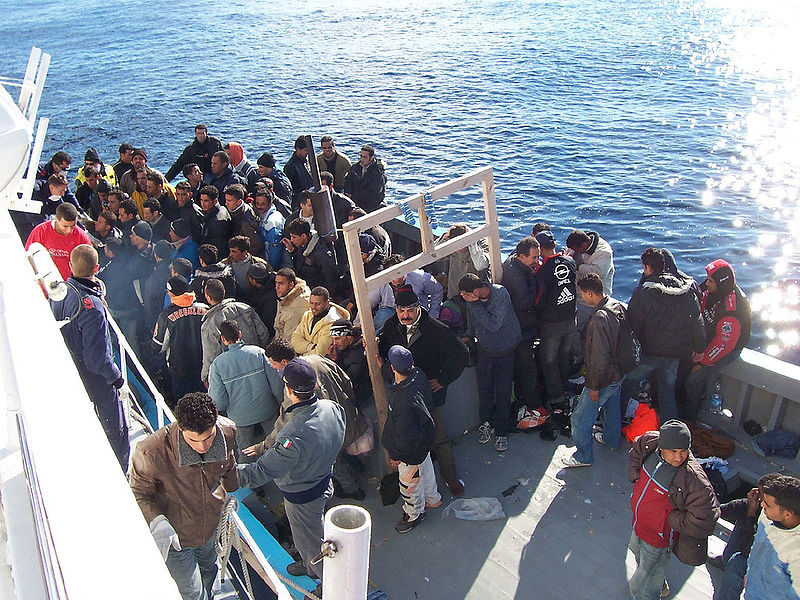In mid-October three hundred people drowned when an overcrowded fishing boat sank offshore from the small Italian island of Lampedusa, midway between Malta and the North African coast of Tunisia. These were emigrants from northern and sub-Saharan Africa seeking a better life in Europe. Living conditions in parts of Africa—already challenging because of overpopulation, drought, famine, disease, and warfare—are being made even more tenuous by climate change. In the face of such difficulties, fleeing Africa for the promise of a better life in Europe becomes a very attractive prospect. The number of refugees fluctuates from year to year, but in 2012 alone 64,000 boat people came ashore in Italy.

Climate change—with its attendant sea level rise, drought, agricultural failure, intensified typhoons, etc.—is likely to up the ante on the already contentious and very serious issue of ecological refugeeism. The United Nation’s Office for the Coordination of Humanitarian Affairs reports that much of the migration funneled through Lampedusa consists of people fleeing the Horn of Africa. Particularly vulnerable are the citizens of Eritrea who face increasingly serious droughts every few years, a result of growing climate variability. While the Lampedusa tragedy itself cannot be definitively said to have been caused by climate change, aid groups are warning,
similar tragedies could happen more often as climate change drives more people away from vulnerable countries towards the continent.
This situation is paralleld in Bangladesh. François Crépeau, a UN consultant on migration, warns that it is now almost certain that global migration will increase in the future due to climate change:
A warming planet is likely to exacerbate the frequency and intensity of extreme weather events like storms, floods and heat waves, while gradual processes of environmental degradation such as desertification and soil and coastal erosion would intensify. For those affected, one natural response will be to migrate.
Crépeau notes that some scientists estimate that by mid-century up to fifteen million Bangladeshis will be displaced by climate change and attendant sea level rise. India has built a 2,100 mile-long high-tech fence along its border to try to keep them from entering.
India, for its part, sees climate change bringing multiple threats. Rivers feeding both Bangladesh and Pakistan pass through India, but threaten to dry up because of melting glaciers. Meanwhile, the country can barely handle demands for resources from its own citizens and argues that it shouldn't have to accept the victims of a problem caused by the industrialized world.
For inhabitants of already industrialized nations—by far the biggest contributors of greenhouse gases—numerous ethical issues are raised by the prospect of new waves of human population relocation. Are countries morally obligated to welcome refugees from nations that border them, but not to take in refugees from more distant nations? Is a country's moral obligation to accept refugees greater or less if the issue compelling the migration is escape from rising waters, rather than escape from famine or drought or tribal warfare? Upon which nation is it incumbent to offer safe haven for the population of a gradually submerging island nation in the Pacific? If a country does take in an entire national population, is there an obligation to relocate some of its own citizens to make room so that a welcomed refugee population can retain its cultural and linguistic integrity?
To be sure, large population movements have been frequent throughout human history, In an article in History, Future, Now, Tristan Fischer makes a pointed comparison between current patterns of mass relocation and other migrations in European history:
At some point, this divergence between population growth and food availability will result in the prospect of widespread starvation in North Africa. As with Germanic tribes 1,650 years ago, North African family groups and political leaders will have to ask themselves a tough question: are we more likely to die by staying here and starving or crossing the Mediterranean Sea into the European Union en masse and confronting a military response by the European Union? Given the fact that the European Union is politically divided, militarily weak and culturally pacifist it is highly unlikely that any useful military response would be forthcoming. If I were a Libyan, I would stake my life on crossing into Europe rather than staying behind to starve.
The Lampedusa tragedy is a warning for us both (1) to anticipate the probable effects of climate change, and (2) to begin reflecting on our moral responsibility in the face of this escalating crisis. Unlike residents of the crumbling Roman Empire—who desperately and powerlessly confronted the Visigothic, Vandal, and Hunnish hordes converging on Europe—in 2013 we have a more global vantage point from which to view the causes and consequences of human mass migration. With our knowledge from genetics that Homo sapiens is a single species, and with two millennia of ethical reflection about human rights and responsibilities under our cultural belt, those of us who are citizens of industrialized nations should initiate honest and deeply reflective conversations about how we approach the issue of huge numbers of people like us desperate to escape catastrophe and seek a new homeland.
